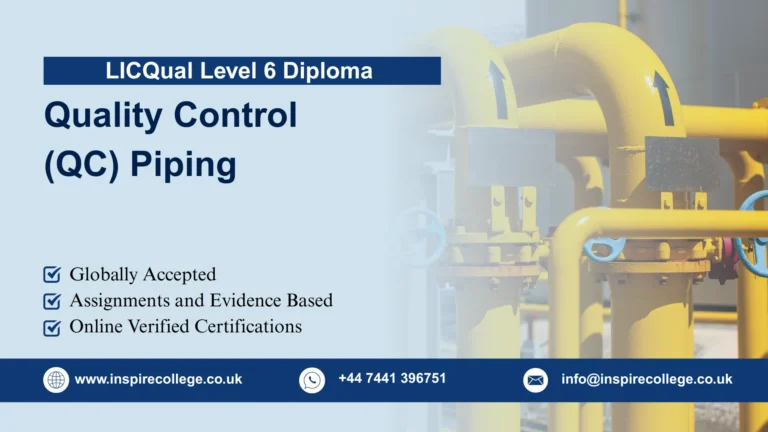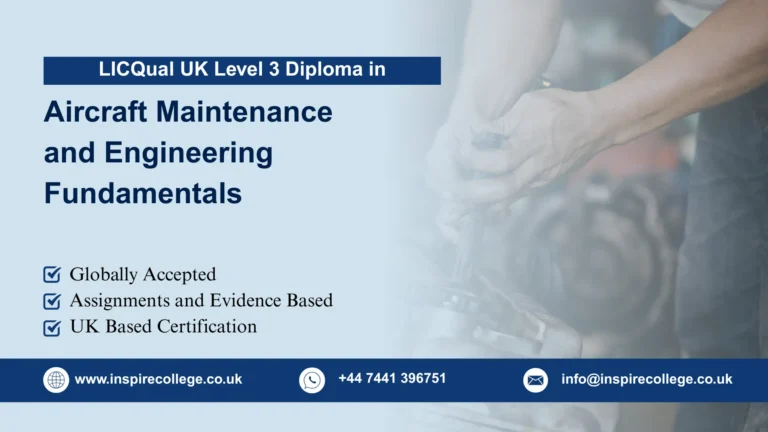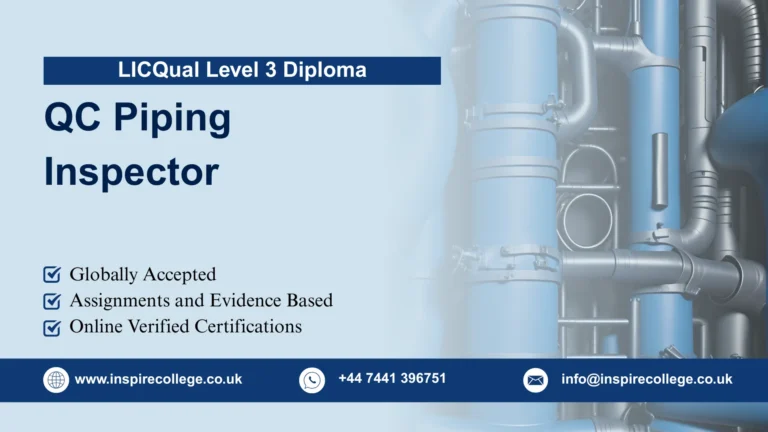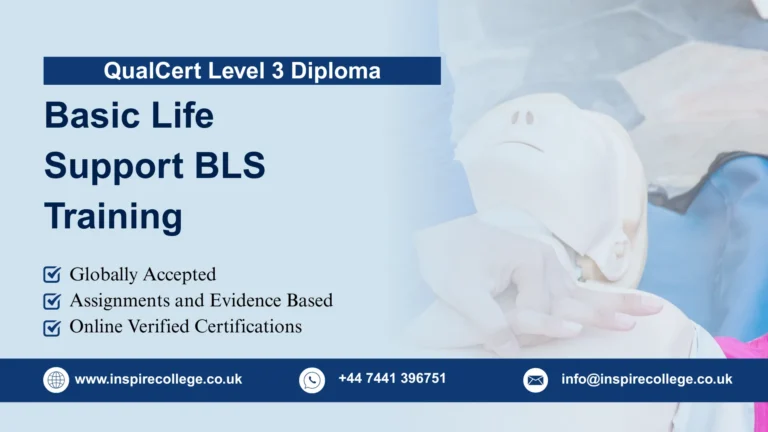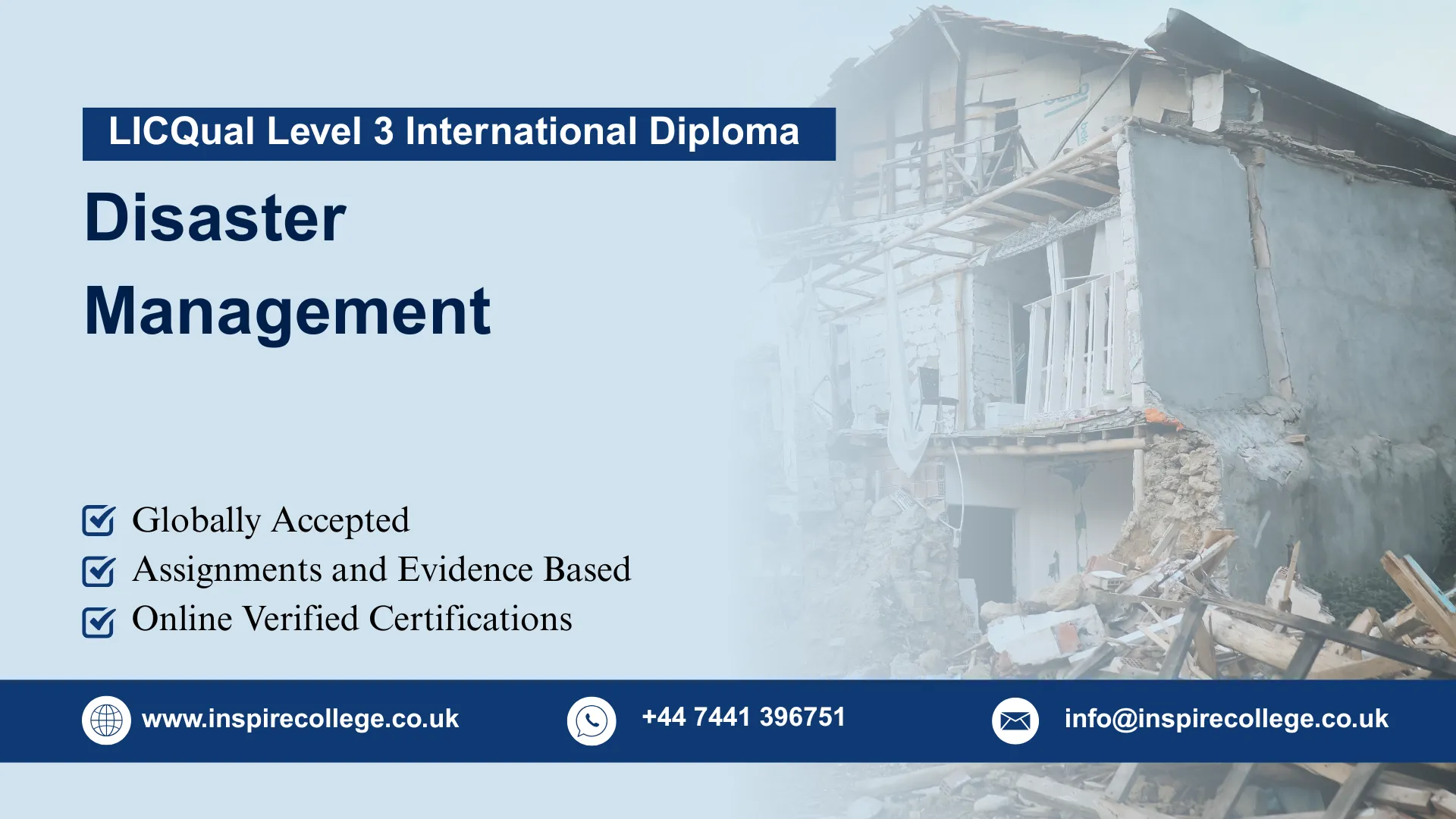
LICQual Level 3 International Diploma in Disaster Management
In an era marked by increasingly frequent natural and human-made disasters, the demand for skilled professionals in disaster management has never been greater. The LICQual Level 3 International Diploma in Disaster Management is designed to provide learners with the essential knowledge, practical skills, and strategic insight required to effectively manage risks, respond to emergencies, and contribute to sustainable recovery and resilience efforts across communities and organizations worldwide.
LICQual Level 3 International Diploma in Disaster Management covers the full spectrum of disaster management, including risk assessment, emergency preparedness, response coordination, and post-disaster recovery. Learners will gain a deep understanding of the disaster management cycle and explore strategies for hazard identification, vulnerability analysis, and disaster mitigation. LICQual Level 3 International Diploma in Disaster Management emphasizes both theoretical knowledge and practical applications, ensuring participants are capable of making informed decisions under pressure, coordinating emergency response teams, and implementing effective disaster preparedness plans.
LICQual Level 3 International Diploma in Disaster Management also addresses key international standards, frameworks, and best practices in disaster management, enabling learners to work confidently in diverse settings, including humanitarian organizations, government agencies, non-governmental organizations (NGOs), and private sector entities involved in emergency response. Participants will develop critical skills in disaster risk reduction, crisis communication, resource management, and resilience planning, equipping them to minimize the impact of disasters on lives, property, and the environment.
By completing the LICQual Level 3 International Diploma in Disaster Management, learners will be prepared to take on professional roles in disaster preparedness, emergency management, and resilience coordination. LICQual Level 3 International Diploma in Disaster Management empowers participants to make a tangible difference in creating safer communities, strengthening organizational response strategies, and advancing their careers in this vital and growing field.
To ensure learners are fully prepared to succeed in the LICQual Level 3 International Diploma in Disaster Management, applicants must meet specific criteria relating to age, education, experience, and language proficiency. These requirements are designed to guarantee that participants have the foundational knowledge, motivation, and readiness to engage effectively with course content and practical applications.
- Age Requirement
- Applicants must be at least 16 years old at the time of enrollment.
- This minimum age ensures learners possess the maturity and responsibility necessary to participate in professional-level studies, handle complex concepts, and engage in collaborative learning activities related to disaster management.
- Educational Qualifications
- Candidates should have a minimum of Level 2 qualifications, such as GCSEs or equivalent, in relevant subjects including English and Mathematics.
- While a prior background in disaster management, emergency response, humanitarian studies, or related fields is advantageous, it is not mandatory, making the course accessible to learners from diverse academic backgrounds.
- This ensures that participants have the essential skills in literacy, numeracy, and analytical thinking required to understand disaster management principles, assess risks, and engage in planning and response exercises effectively.
- Professional Experience
- No specific work experience is required for entry into the program.
- Applicants with previous exposure to emergency management, humanitarian operations, crisis response, or community safety initiatives may find the course content more practical and directly applicable.
- All learners should demonstrate a genuine interest in pursuing a career in disaster management, particularly in international or large-scale disaster response and recovery contexts, ensuring commitment to the course and professional growth.
- English Language Proficiency
- As the course is delivered entirely in English, all participants must demonstrate proficiency in reading, writing, speaking, and comprehension.
- Non-native English speakers are required to provide evidence of language proficiency through recognized tests or qualifications to ensure they can fully engage with course materials, participate in discussions, and complete assessments successfully.
Mandatory Units
The LICQual Level 3 International Diploma in Disaster Management, to achieve the qualification candidates must complete all the mandatory units form the following :
Mandatory Units
- Disaster Management: A Helicopter View
- Disaster Mitigation
- Disaster Preparedness
- Disasters Response
- Disaster Recovery
- Information Technology in Disaster Management
By the end of this course, learners will be able to:
- Disaster Management: A Helicopter View
- Gain a comprehensive understanding of the principles, frameworks, and global standards guiding disaster management.
- Analyze the key concepts, phases, and operational frameworks involved in preparing for, responding to, and recovering from disasters.
- Identify the roles and responsibilities of various stakeholders, including government agencies, non-governmental organizations (NGOs), and international bodies, in coordinating disaster management efforts.
- Evaluate global and local challenges in disaster management and develop strategies for effective collaboration and coordination among multiple agencies.
- Disaster Mitigation
- Understand the core strategies and measures used to reduce the impact of potential disasters on communities and infrastructure.
- Assess the importance of risk reduction, policy-making, and regulatory frameworks in disaster mitigation planning.
- Identify methods to enhance resilience in communities vulnerable to disasters, focusing on social, infrastructural, and environmental interventions.
- Develop disaster mitigation plans tailored to specific regional, national, or hazard-specific risks.
- Disaster Response
- Comprehend the key principles, processes, and operational steps involved in effective disaster response and emergency management.
- Examine the logistics, coordination mechanisms, and operational strategies required to deliver immediate aid and relief during disaster scenarios.
- Learn to work collaboratively with local authorities, humanitarian organizations, and international partners to ensure timely and efficient response.
- Evaluate real-world case studies of disaster responses to identify lessons learned and best practices for future scenarios.
- Disaster Preparedness
- Understand the critical importance of planning and preparation for a wide range of natural and man-made disasters.
- Develop disaster preparedness plans for individuals, organizations, and communities to enhance readiness and resilience.
- Identify and analyze early warning systems, risk assessment tools, and emergency communication strategies for disaster prevention and preparedness.
- Conduct simulations, drills, and training exercises to improve readiness, response efficiency, and decision-making during emergencies.
- Information Technology in Disaster Management
- Explore the role of information technology in modern disaster management practices.
- Understand how data collection, analysis, and communication technologies support disaster risk reduction, response, and recovery efforts.
- Evaluate the effectiveness of Geographic Information Systems (GIS), remote sensing, and mobile applications in improving situational awareness and coordination.
- Integrate technological solutions into disaster management plans to enhance planning, decision-making, and operational efficiency.
- Disaster Recovery
- Develop strategies for long-term recovery, reconstruction, and community resilience following a disaster.
- Assess the social, economic, and environmental challenges faced during the recovery and rebuilding phases.
- Learn to mobilize resources, including local and international aid, to support recovery efforts effectively.
- Understand the importance of community participation in recovery planning and implement sustainable strategies that enhance long-term resilience.
Who This Diploma is Ideal For
- Aspiring Disaster Management Professionals
- Individuals aiming to build or advance their careers in disaster management, emergency response, and humanitarian assistance.
- Learners seeking to gain practical skills and knowledge to respond effectively to crises and contribute to resilient communities.
- Government and NGO Professionals
- Professionals currently working in government agencies, non-governmental organizations (NGOs), or international bodies involved in disaster preparedness, response, and recovery.
- Those looking to strengthen their expertise in emergency coordination, policy implementation, and disaster response strategies.
- Global Disaster Management Enthusiasts
- Individuals interested in understanding international disaster management frameworks, strategies for managing natural and man-made disasters, and global risk reduction practices.
- Learners keen to analyze and apply global best practices in disaster preparedness, mitigation, and recovery.
- Specialists in Disaster Risk Reduction and Crisis Management
- People aiming to gain expertise in disaster risk assessment, crisis management, emergency response, and recovery efforts at both local and international levels.
- Aspiring professionals who wish to lead initiatives that enhance community resilience and disaster preparedness.
- Current Practitioners Seeking Career Enhancement
- Individuals working in related fields such as public safety, healthcare, environmental management, or humanitarian work who want to expand their knowledge and practical skills in disaster management.
- Professionals seeking to integrate disaster management strategies into their current roles and improve operational effectiveness.
- IT and Innovation-Focused Learners
- Individuals interested in leveraging information technology, data analysis, and innovative solutions to enhance disaster response, early warning systems, and recovery operations.
- International Development and Humanitarian Work Aspirants
- Learners aiming to pursue careers in international development or humanitarian organizations with a focus on disaster risk reduction, relief coordination, and global emergency management.
- Career-Oriented Professionals
- Those seeking a recognized, accredited qualification to enhance professional credibility, demonstrate expertise in disaster management, and improve career prospects within the sector.
Register Now
LICQual Level 3 International Diploma in Disaster Management

